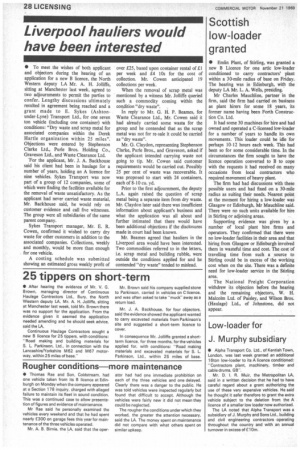Liverpool hauliers would have been interested
Page 30

If you've noticed an error in this article please click here to report it so we can fix it.
• To meet the wishes of both applicant and objectors during the hearing of an application for a new B licence, the North Western deputy LA Mr. A. H. Jolliffe, sitting at Manchester last week, agreed to two adjournments to permit the parties to confer. Lengthy discussions ultimately resulted in agreement being reached and a grant made to E. Sykes (Ashtonunder-Lyne) Transport Ltd.. for one seven ton vehicle (including one container) with conditions: "Dry waste and scrap metal for associated companies within the Derek Hartle organization within 25 miles". Objections were entered by Stephenson Clarke Ltd., Purle Bros. Holding Co.. Graveson Ltd.. and Waste Clearance Ltd.
For the applicant, Mr. J. A. Backhouse said his client had been in haulage for a number of years, holding an A licence for nine vehicles. Sykes Transport was now part of a group of 12 companies, some of which were finding the facilities available for the removal of waste unsatisfactory. As the applicant had never carried waste material, Mr. Backhouse said, he would rely on customer evidence and call five witnesses. The group were all subsidiaries of the same parent company.
Sykes Transport manager, Mr. E. R. Cowen, confirmed it wished to carry dry waste for other customers in addition to the associated companies. Collections, weekly and monthly, would be more than enough for one vehicle.
A costing schedule was submitted showing an estimated gross weekly profit of over £25, based upon container rental of £1 per week and £4 lOs for the cost of collection. Mr. Cowen anticipated 19 collections per week.
When the removal of scrap metal was mentioned by a witness Mr. Jolliffe queried such a commodity coming within the condition "dry waste".
In reply to Mr. G. H. P. Beames. for Waste Clearance Ltd., Mr. Cowen said it had already carried some waste for the group and he contended that as the scrap metal was not for re-sale it could be carried as "dry waste".
Mr. G. Claydon, representing Stephenson Clarke, Purle Bros., and Graveson, asked if the applicant intended carrying waste not going to tip. Mr. Cowen said customer requirements would be carried out. Possibly 25 per cent of waste was recoverable. It was proposed to start with 24 containers, each of 8-10 cu. yd.
Prior to the first adjournment, the deputy L.A. again raised the question of scrap metal being a separate item from dry waste. Mr. Claydon later said there was insufficient information about applicant's business and what the application was all about and further intimated that there would have been additional objections if the disclosures made in court had been known.
Mr. Beames agreed that hauliers in the Liverpool area would have been interested. Two commodities referred to in the letters, i.e. scrap metal and building rubble, were outside the conditions applied for and he contended "dry waste" tended to mislead.




































































































